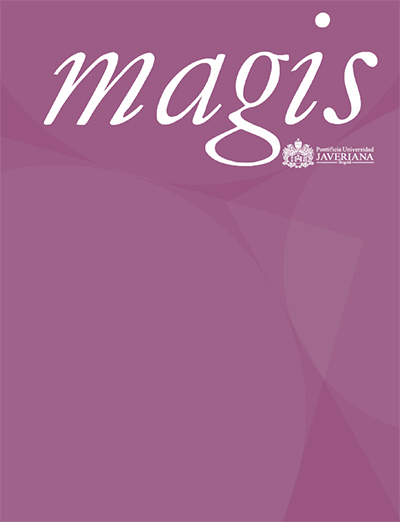Abstract
This article examines how the models of social recognition contribute to the school practices of demobilized young people from the organizations involved in the armed conflict in Colombia, who decide to return to the educational system. Results of this reflection are presented in four sections.
Alvarado, Sara Victoria; Ospina, Héctor Fabio; Quinte- ro, Marieta; Luna, María Teresa; Ospina, María Camila & Patiño, Jhoana A. (2012). Las escuelas como territorios de paz. Construcción social del niño y la niña como sujetos políticos en contextos de conflicto armado. Luis Tapia & María Isabel Orofino, prólogo. Ciudad Autónoma de Buenos Aires: CLACSO, Universidad de Manizales, CIN- DES, 2012. Disponible en: http://biblioteca.clacso.edu.ar/clacso/posgrados/20120910105957/LasEscuelascomoTerritoriosdePaz.pdf
Aristóteles (2003). Ética a Nicómaco. Julio Pallí-Bonet (trad.), Madrid: Gredos.
Benedetti, Mario (2001). El olvido está lleno de me- moria. Madrid: Visor Libros, Colección Visor de Poesía.
Habermas, Jürgen (1991, 2000). Del uso pragmático, ético y moral de la razón práctica. En Aclaraciones a la ética del discurso. Manuel Jiménez- Redondo (trad.), Madrid: Trotta. Disponible en: http://www.inau.gub.uy/biblioteca/seminario/eticadiscurso.pdf
Hegel, Georg Wilhelm Friedrich (1973). Fenomenología del espíritu. México: Fondo de Cultura Eco- nómica, FCE.
Hegel, Georg Wilhelm Friedrich (2006). El Sistema de la eticidad. Buenos Aires: Editorial Quadrata.
Honneth, Axel (1997). La lucha por el reconocimiento. Por una gramática moral de los conflictos sociales. Barcelona: Ed. Crítica.
Honneth, Axel (2009). Crítica del agravio moral. Patologías de la sociedad contemporánea. Peter Storandt-Diller & Gustavo Leyva, trads., Buenos Aires: Fondo de Cultura Económica, FCE.
Honneth, Axel (2010). Reconocimiento y menosprecio. Sobre la fundamentación normativa de una teoría social. Buenos Aires: Katz.
Mate, Manuel Reyes (2006). Contra lo políticamente correcto. Política, memoria y justicia. Buenos Aires: Editorial Altamira.
Montoya-Londoño, Mauricio (2010). Lo justo: entre lo bueno y lo legal. Un diálogo entre la intencionalidad ética de Paul Ricœur y el constructivismo político de John Rawls. Tesis para optar el título de doctor de Filosofía. Facultad de Filosofía, Pontificia Universidad Javeriana, Bogotá. Disponible en: http://repository.javeriana.edu.co/bitstream/10554/1096/1/MontoyaLondo%C3%B1oMauricio2010.pdf
Nussbaum, Martha C. (2007). Las fronteras de la justicia. Consideraciones sobre la exclusión. Barcelona: Ediciones Paidós Ibérica.
Nussbaum, Martha C. (2008). Paisajes del pensamiento: la inteligencia de las emociones. Madrid: Ediciones Paidós Ibérica.
Nussbaum, Martha C. (2010). Sin fines de lucro. Por qué la democracia necesita de las humanidades. María Victoria Rodil, trad., Buenos Aires, Madrid: Katz Editores.
Ricœur, Paul (2001). Amor y justicia. Madrid: Caparrós Editores.
Ricœur, Paul (2003). Sí mismo como otro. Séptimo estudio: El sí y la intencionalidad ética. Octavo estudio: El sí y la norma moral. Agustín
Neira-Calvo (trad.), Madrid: Siglo XXI de España Editores.
Ricœur, Paul (2004). La memoria, la historia, el olvido. Buenos Aires: Fondo de Cultura Económica, FCE.
Ricœur, Paul (2006). Caminos del reconocimiento. Tres estudios. México:Fondo de Cultura Económica, FCE.
Magis, International Journal of Research in Education by Pontificia Universidad Javeriana is registered under a Creative Commons Attribution 4.0 International Public License. Thus, this work may be reproduced, distributed, and publicly shared in digital format, as long as the names of the authors and Pontificia Universidad Javeriana are acknowledged. Others are allowed to quote, adapt, transform, auto-archive, republish, and create based on this material, for any purpose (even commercial ones), provided the authorship is duly acknowledged, a link to the original work is provided, and it is specified if changes have behttps://creativecommons.org/licenses/by/4.0/en made. Pontificia Universidad Javeriana does not hold the rights of published works and the authors are solely responsible for the contents of their works; they keep the moral, intellectual, privacy, and publicity rights.
Approving the intervention of the work (review, copy-editing, translation, layout) and the following outreach, are granted through an use license and not through an assignment of rights. This means the journal and Pontificia Universidad Javeriana cannot be held responsible for any ethical malpractice by the authors. As a consequence of the protection granted by the use license, the journal is not required to publish recantations or modify information already published, unless the errata stems from the editorial management process. Publishing contents in this journal does not generate royalties for contributors.
Creative Commons Attribution 4.0 International Public License



